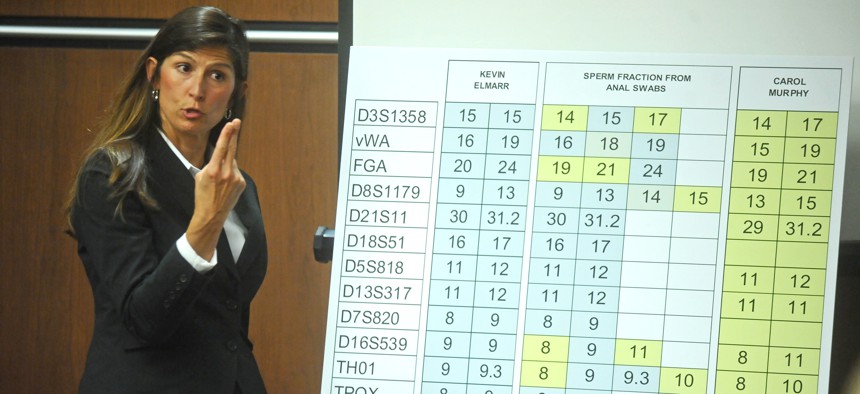Juries often struggle to understand forensic science. A short training video could help.

A forensic scientist testifies before a jury about genetic material in a murder trial. Jurors often struggle to understand forensic science and it has led to wrongful convictions. Marty Caivano/Digital First Media/Boulder Daily Camera via Getty Images
COMMENTARY | One out of every five wrongful convictions cataloged through September 2023 involved improper forensic evidence. Studies indicate that just a little training could help jurors avoid sending innocent people to prison.
This article is republished from The Conversation. Read the original article.
Ledura Watkins was 19 years old when he was accused of murdering a public school teacher. At trial, a forensic expert testified that a single hair found at the scene was similar to Watkins’ and stated his conclusion was based on “reasonable scientific certainty.” He explained that he’d conducted thousands of hair analyses and “had never been wrong.”
This one hair was the only physical evidence tying Watkins to the crime. In 1976, Ledura Watkins was convicted of first-degree murder and sentenced to life in prison without the possibility of parole.
Here’s the catch: The expert’s testimony was inappropriate and misleading, and the jury made a mistake. Watkins was innocent. Ledura Watkins lost over 41 years of his life to a wrongful conviction based on improper forensic testimony.
Our interdisciplinary team of legal psychologists, forensic experts and an attorney worked to develop an educational tool to help jurors avoid making similar mistakes in the future.
Forensic Testimony Carries Weight with Jurors
One out of every five wrongful convictions cataloged through September 2023 by the National Registry of Exonerations involved improper forensic evidence.
There is reason to be concerned about jurors’ ability to adequately evaluate forensic evidence. Jurors tend to rely heavily on forensic evidence when making decisions in a case, despite struggling to understand the statistical analyses and language used to explain forensic science. They might ignore the differences between appropriately worded forensic testimony and testimony that violates best-practice guidelines, fail to grasp the limitations of forensic science in expert witness testimony and overly rely on an expert’s experience when evaluating the evidence.
Despite all these issues, jurors remain overconfident in their ability to comprehend forensic testimony.
Researchers have long suggested that part of the problem is the way forensic evidence is presented in courtrooms. In response to calls by scientists, the U.S. Department of Justice approved the Uniform Language for Testimony and Reports in 2018. These guidelines aimed to lessen misleading statements in forensic testimony and outlined five statements forensic experts should not make. The expert in Ledura Watkins’ case made several of these statements, including claiming that his examination was perfect because of the number of examinations he had conducted.
It’s understandable that jurors are swayed by an expert who uses terms like “error free,” “perfect” or “scientific certainty.” We are interested in finding ways to help people critically evaluate the forensic testimony they hear in court.
An Informational Video for Jurors
Inspired by one court’s use of videos to help train jurors on relevant concepts, our team developed what we call the forensic science informational video. It’s about 4½ minutes long and focuses on latent print examinations, including fingerprints, footwear impressions and tire impressions.
In the FSI video, a narrator explains what a forensic expert is and how they might testify in court. The video describes how latent print examinations are conducted and what types of statements are appropriate—or not—for an expert to make in their testimony, based on the DOJ guidelines.
In two different studies, we recruited jury-eligible adults to test whether our video had any effect on how jurors judged forensic testimony.
In our first study, some participants watched the FSI video and others didn’t. Participants who watched the FSI video were more likely to give lower ratings to improper forensic testimony and the forensic expert who gave it.
In our second study, we tested whether the video could help jurors differentiate between low-quality and high-quality testimony without creating a general distrust in forensic evidence. Participants watched a 45-minute mock trial video. Without training from the FSI video, participants rated both low- and high-quality forensic testimony highly. That is, they didn’t differentiate between testimony in which the expert violated three of the DOJ guidelines and testimony that followed the guidelines.
But participants who watched our informational video prior to the mock trial were more likely to differentiate between the low- and high-quality testimony, rating the expert giving low-quality testimony more poorly than the expert giving high-quality testimony.
Training Helps Jurors Assess Forensic Testimony
These findings suggest that our informational video helped mock jurors in two ways. Participants learned how to identify low-quality forensic testimony and how to adjust their evaluations of the expert and their testimony accordingly. Importantly, the video did not cause participants to distrust latent print evidence in general.
Our study is a promising first step in exploring ways to help jurors understand complex forensic testimony. A brief video like ours can provide standardized information about forensic experts and types of appropriate and inappropriate testimony to jurors across courts, much like similar videos about implicit bias already being used in some courts.
We believe a training video has the potential to be easily implemented as an educational tool to improve the quality of jurors’ decision-making. A better understanding of the distinction between proper and improper testimony would improve the justice system by helping jurors fulfill their roles as objective fact-finders—and hopefully prevent wrongful convictions like that of Ledura Watkins.
![]()
Devon LaBat, Doctoral Candidate in Legal Psychology, Florida International University; Deborah Goldfarb, Assistant Professor of Psychology, Florida International University; Jacqueline R. Evans, Associate Professor of Psychology, Florida International University, and Nadja Schreiber Compo, Professor of Psychology, Florida International University
NEXT STORY: Rethinking engagement to support a rapidly growing older adult population





